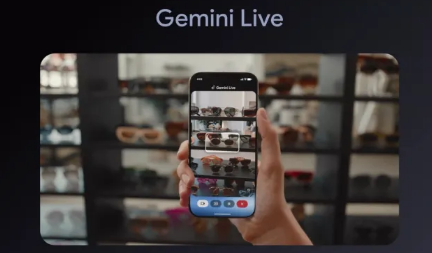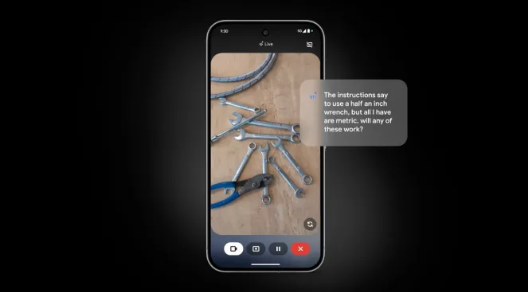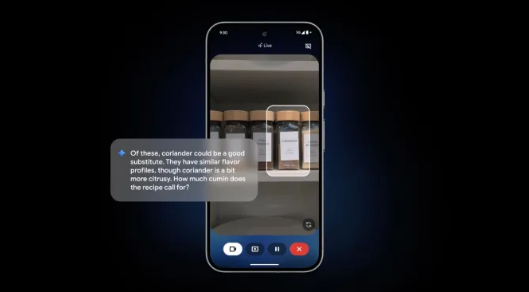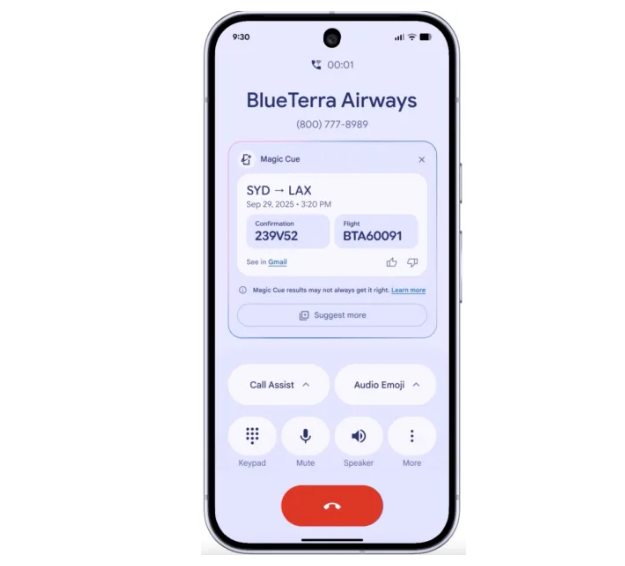AIbase Report - At the "Google Made" event on Wednesday, Google officially launched the new Pixel 10 smartphone series, just a few weeks before Apple's expected release of the iPhone 17. This marks another significant move by Google in the AI-driven smartphone market.
Comprehensive AI Enhancements
The Pixel 10 series is equipped with Google's latest Tensor G5 processor, an upgraded custom chip designed for AI experiences and the first to run the latest Gemini Nano model. Compared to the Gemini Live voice mode, image generation tools, and call recording features introduced in last year's Pixel 9 series, the new product represents a qualitative leap in AI capabilities.
Gemini Live has received major updates. The new audio model can detect changes in user tone (such as excitement or concern) and adjust responses accordingly. According to Google data, the conversation length of Gemini Live has reached five times that of text-based conversations.
Visual Overlay allows Gemini Live to recognize content in the camera lens and provide real-time guidance through screen highlights. For example, when traveling abroad, users can hold up their phone to view road signs and receive immediate interpretations about roadside parking.

Magic Cue: An AI Assistant Redefining Interaction
The Magic Cue feature is one of the highlights of this release. It enables the AI to proactively offer contextual suggestions in applications such as Gmail, calendar, messages, and screenshots. This feature redefines the concept of Google Now from earlier, integrating it into daily app interactions using AI.
The feature can recommend restaurants, make quick bookings, suggest replies to messages, and display them in a personalized summary in the "Daily Hub." Magic Cue's suggestions are differentiated by rainbow-colored outlines, allowing users to take action directly by clicking. The initial version supports setting tabs, adding events to the calendar, and weather forecasts, with future expansions planned to include more options and allow users to configure data sources.

Photography Revolution: From AI Coach to Professional Zoom
Camera Coach is introduced as a preview feature, an AI photography assistant that provides composition advice using the Gemini model and even recommends shooting scenarios that users may not have considered.
Auto Best Shot can identify group photo scenes and analyze up to 150 photos in seconds, using AI synthesis to find the best shot. The new "Ask About Photo" tool allows users to edit photos through conversation, adjusting lighting, changing the frame, or removing objects.
The Pro version's Pro Res Zoom function uses AI to achieve 30-60x zoom, suitable for various shooting scenarios such as architecture, landscapes, and animals.

Breakthrough Communication Features
Voice Translation has achieved a true technological breakthrough, using built-in AI to translate call content in real time while preserving each speaker's original voice characteristics. This feature supports bidirectional translation between English and Spanish, German, Japanese, French, Hindi, Italian, Portuguese, Swedish, Russian, and Indonesian, which is of great significance for business users and global travelers.
Voicemail can record missed and rejected calls in real time, using AI to identify follow-up actions based on voice messages. At the same time, Pixel Journal, as a response to Apple's Journal app, uses AI to prompt users to share ideas, track goal progress, and provide long-term insights.

Setting Technological Standards
The Pixel 10 series will also be the first to support the C2PA standard, a technology used to determine the source and editing history of digital content, helping to identify whether a photo has been modified by AI, which is of great importance for verifying the authenticity of digital content.
Other upgrades include writing tools integrated into the Gboard keyboard, updated Pixel Studio screenshots, and the integration of Notebook LM with the recorder and screenshots.
With the release of the Pixel 10 series, Google further strengthens its leading position in AI smartphones, while Apple's AI-powered Siri is not expected until 2026, providing Google with a valuable time window to gain a competitive edge in the AI smartphone market.
